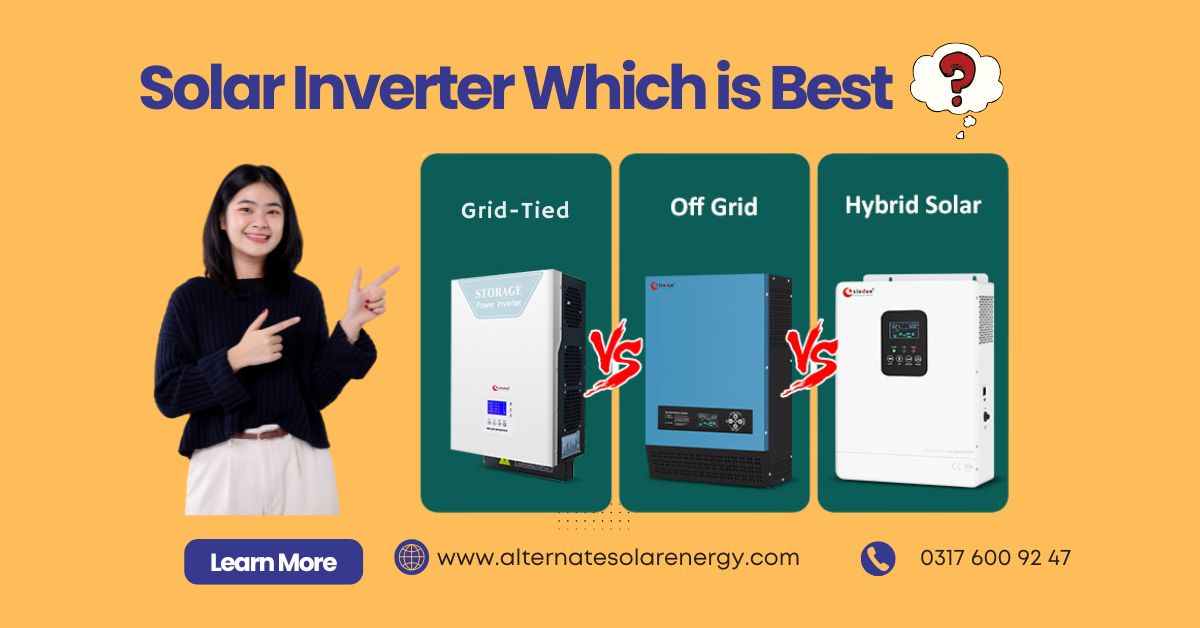Introduction
As electricity costs continue to rise in Pakistan and power outages become more frequent, solar energy is gaining popularity as a reliable and cost-effective solution. But going solar isn’t just about installing solar panels. One of the most important components of any solar power system is the solar inverter. It converts the direct current (DC) electricity produced by your solar panels into alternating current (AC), which is used by most home appliances.
When it comes to choosing a solar inverter, most homeowners and businesses are faced with three main options: Grid-Tied, Hybrid, and Off-Grid inverters. Each has its own advantages depending on your energy needs, budget, and location.
In this guide, we’ll explain what each type does, compare their pros and cons, and help you decide which solar inverter is the best choice for your situation—whether you live in Lahore, Karachi, Islamabad, or a remote village in Pakistan.
What is a Solar Inverter?
A solar inverter is the core component of any solar power system. Its main function is to convert DC (Direct Current) electricity produced by solar panels into AC (Alternating Current) electricity, which powers your lights, fans, TVs, and other home appliances.
Without a solar inverter, your solar panels are useless for everyday use. Think of it as the “brain” of your solar system—it not only converts energy but also manages how power is distributed, whether to your home, battery storage, or back to the grid.
Overview of Solar Inverter Types
There are three main types of solar inverters used in Pakistan: Grid-Tied, Hybrid, and Off-Grid inverters. Let’s take a closer look at how each one works and where it fits best.
1. Grid-Tied Inverter
A Grid-Tied Solar Inverter is connected directly to the national electricity grid (WAPDA in Pakistan). It allows you to use solar power during the day and switch back to the grid when the sun isn’t shining.
Key Features:
- No batteries required
- Supports net metering, allowing you to send excess energy back to the grid and receive credit
- Ideal for urban areas with reliable electricity
Pros:
- Lower installation cost since no batteries are used
- Highly efficient during sunlight hours
- Can reduce your electricity bill to almost zero if net metering is used
Cons:
- Doesn’t work during load-shedding unless battery backup is added
- Fully dependent on grid availability
2. Hybrid Inverter
A Hybrid Inverter is a mix of grid-tied and off-grid systems. It can send power to your home, store excess energy in batteries, and also interact with the grid.
Key Features:
- Works with or without the grid
- Can charge batteries and supply power during outages
- Supports net metering in most cases
Pros:
- Provides power during load-shedding
- Offers flexibility and energy independence
- Ideal for homes and offices with unstable grid connections
Cons:
- Slightly more expensive than grid-tied inverters
- Requires battery maintenance over time
3. Off-Grid Inverter
An Off-Grid Inverter operates independently of the electricity grid. It relies entirely on solar panels and battery storage to power your home or business.
Key Features:
- No connection to the utility grid
- 100% powered by solar and battery storage
- Designed for remote or rural areas
Pros:
- Complete energy independence
- Ideal for areas with no grid access
- Works well in places with frequent or long power outages
Cons:
- Expensive due to battery and large system requirements
- Needs careful sizing to meet daily power needs
- Batteries require replacement every few years
Comparative Table: Grid-Tied vs Hybrid vs Off-Grid
| Feature | Grid-Tied | Hybrid | Off-Grid |
|---|---|---|---|
| Grid Dependency | Yes | Optional | No |
| Battery Required | No | Yes (optional) | Yes |
| Load-Shedding Protection | No | Yes | Yes |
| Net Metering Compatible | Yes | Yes | No |
| Installation Cost | Low | Medium | High |
| Ideal Location | Cities (Lahore, Karachi) | Cities + Towns | Villages, Remote Areas |
Factors to Consider When Choosing a Solar Inverter
1. Location and Grid Reliability
If you live in a big city like Lahore or Islamabad with stable electricity, a grid-tied system might work best. But if you’re in a smaller town or rural area where load-shedding is frequent, a hybrid or off-grid inverter makes more sense.
2. Energy Usage
Consider how much energy you use daily. A small home may not need battery backup, while a large family house or office may benefit from hybrid or off-grid systems for uninterrupted power.
3. Budget
Solar systems with batteries are more expensive upfront. Grid-tied systems are the most cost-effective option but may not provide backup during outages.
4. Net Metering Availability
If you want to reduce your bill by selling excess solar energy to the grid, make sure your system is net-metering compatible. Grid-tied and hybrid inverters support this feature in Pakistan.
5. Long-Term Goals
Think ahead. If you’re planning to expand your system or go fully off-grid in the future, a hybrid inverter offers more flexibility and upgradability.
Recommendations Based on Usage
Here’s a quick guide to help you choose based on your lifestyle and location in Pakistan:
- Urban Areas (Lahore, Karachi, Islamabad)
→ Best Option: Grid-Tied or Hybrid
If your area has minimal load-shedding, a grid-tied inverter will save you the most money. Add batteries later with a hybrid if needed. - Areas with Load-Shedding (Faisalabad, Multan, etc.)
→ Best Option: Hybrid Inverter
Offers both backup during outages and net metering when available. - Remote or Off-Grid Locations (Cholistan, Balochistan Villages)
→ Best Option: Off-Grid Inverter
Perfect for areas with no access to WAPDA electricity. Provides complete energy freedom.
Expert Tip: Combine the Right Inverter with Professional Installation
No matter which inverter type you choose, professional installation makes all the difference. Poor installation can reduce efficiency and even damage your system.
At Alternate Solar Energy, we offer complete solar solutions with expert guidance. Our team helps you choose the best inverter based on your energy needs, location, and budget. We also assist in net metering approvals and provide ongoing system maintenance.
Conclusion
Choosing the right solar inverter is a key decision in your solar journey. Whether you pick a grid-tied system to cut down bills, a hybrid system for backup power, or go fully off-grid for independence, each inverter type serves a specific purpose.
With the right advice and proper installation, your solar system can save you money, reduce dependence on WAPDA, and give you reliable energy for years to come.
Looking for a reliable solar inverter solution in Pakistan?
Alternate Solar Energy provides expert consultation, high-quality solar equipment, and certified installations across Lahore, Karachi, Islamabad, and beyond. Let our team help you choose the perfect inverter—Grid-Tied, Hybrid, or Off-Grid—tailored to your needs. Our Company is Register enests.com
📞 Contact us today for a free solar assessment!
🌐 Visit: https://alternatesolarenergy.pk/solar-inverter/
📍 Location: Lahore, Pakistan











